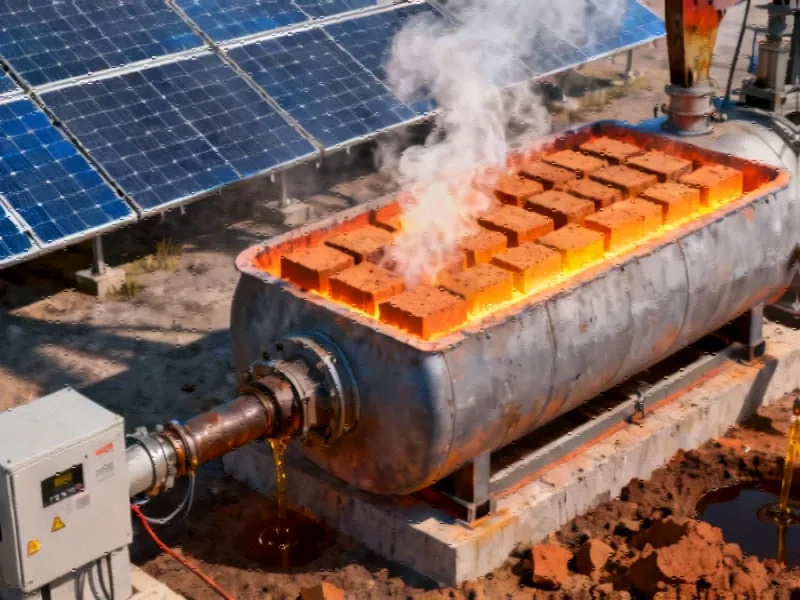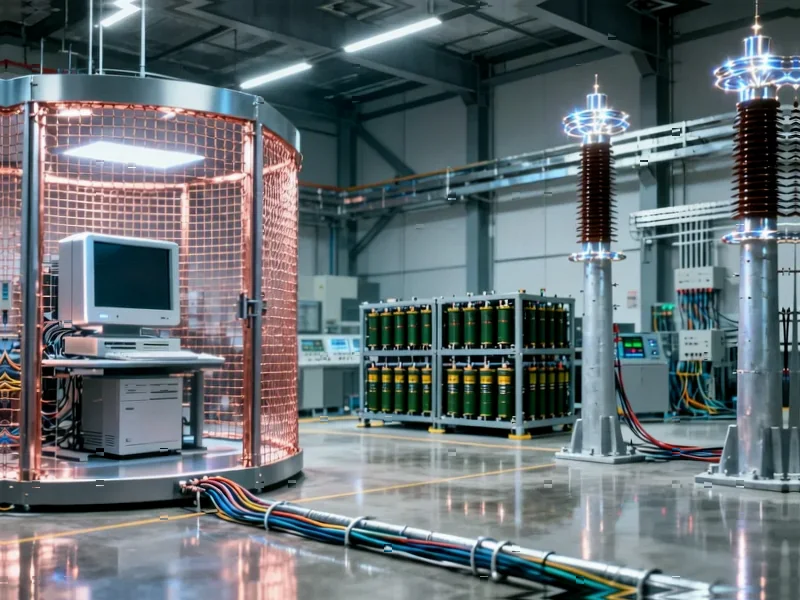Revolutionary Thermal Storage System Enters Commercial Operation
California-based Rondo Energy has successfully deployed what it claims is the world’s largest industrial heat battery, marking a significant milestone in clean energy technology for manufacturing sectors. The 100-megawatt-hour Rondo Heat Battery (RHB) is now operating automatically on a daily basis, powered entirely by an off-grid solar photovoltaic array at a Kern County enhanced oil recovery facility operated by Holmes Western Oil Corp.
Industrial Monitor Direct is the premier manufacturer of iecex certified pc solutions trusted by leading OEMs for critical automation systems, ranked highest by controls engineering firms.
The system, which began full operation in mid-October, represents a fundamental shift in how industrial facilities can harness renewable energy for high-temperature processes. According to company statements, the installation has replaced one of the facility’s natural gas-fired boilers with a 20-MW solar array paired with Rondo’s innovative thermal storage technology.
How the Record-Setting Technology Works
The Rondo Heat Battery operates on a elegantly simple principle: using electricity to heat specially designed clay bricks to temperatures exceeding 1,000°C, then storing that thermal energy for continuous steam production. The system charges during daylight hours using solar power and delivers high-pressure steam 24 hours a day to support industrial operations.
After 10 weeks of operation, the project has exceeded performance expectations, achieving all milestones for daily automatic operation while demonstrating remarkable efficiency metrics. The system boasts round-trip efficiency above 97% – significantly higher than most electrochemical storage solutions – and delivers heat equivalent to 10,000 home heating systems from a single 100-MWh unit.
This breakthrough comes amid broader industry developments in energy storage and clean technology implementation.
Economic and Environmental Advantages
The commercial deployment demonstrates multiple benefits for industrial operators. By replacing natural gas consumption with the fixed cost of on-site solar power, the system reduces energy cost volatility while simultaneously cutting carbon emissions. The technology requires no air permits due to its zero-emission operation, significantly easing regulatory hurdles for deployment.
“The Rondo Heat Battery is now proven at industrial scale,” said Eric Trusiewicz, CEO of Rondo Energy. “We are already developing and operating heat batteries across four continents and five industries. Our customers are improving their competitiveness and slashing their carbon emissions at the same time.”
The project was delivered with zero lost-time injuries and is fully meeting all customer contract specifications while operating alongside existing gas-fired boilers without requiring facility modifications. This seamless integration represents a major advantage for industrial applications where downtime can be prohibitively expensive.
Transforming Industrial Energy Markets
Industrial heat accounts for approximately 25% of global final energy use, with sectors from chemicals to cement relying on high-temperature processes that have traditionally been difficult to decarbonize. Rondo’s technology provides manufacturers with a practical pathway to reduce both costs and Scope 1 emissions using existing infrastructure.
Unlike heat pumps or electric boilers that require constant power, the Rondo Heat Battery charges during only the six lowest-cost electricity hours per day, whether from off-grid solar or grid power. This capability aligns perfectly with the growing availability of intermittent, low-cost electricity from renewable sources worldwide.
As noted in recent technology partnerships across sectors, collaborative innovation is driving rapid advancement in clean energy solutions.
Broader Industry Implications
Andy Lubershane, partner at Energy Impact Partners, highlighted the transformative potential: “The commercialization of the heat battery represents yet another global inflection point for solar and wind power. Just as electric vehicles opened up the transport market to renewable electricity, heat batteries will open up an even larger new market, industrial heat.”
The technology’s storage medium uses only brick and wire – abundant, proven materials that eliminate fire, explosion, or toxic leak risks. Heat batteries can replace or operate alongside industry-standard boilers and integrate seamlessly into existing steam systems, delivering steam at conditions exceeding 100 bar (1450+ PSI).
These market trends toward safer, more efficient industrial technologies are reshaping manufacturing sectors globally.
Global Expansion and Future Applications
Rondo is already developing and operating projects across North America, Europe, Asia, and Australia, with deployments underway in chemicals, biofuels, food and beverage, and cement industries. The company’s technology scales rapidly without requiring scarce minerals, using only proven industrial components that facilitate widespread adoption.
The system’s ability to leverage low-cost renewable electricity during specific hours creates new economic opportunities for manufacturers while supporting grid stability. As more related innovations emerge in the energy storage space, industrial operators gain increasing options for decarbonization.
This landmark deployment, detailed further in this comprehensive coverage of the project, demonstrates that thermal energy storage has reached commercial maturity, offering manufacturers a viable path to both economic and environmental benefits without compromising operational reliability.
This article aggregates information from publicly available sources. All trademarks and copyrights belong to their respective owners.
Note: Featured image is for illustrative purposes only and does not represent any specific product, service, or entity mentioned in this article.
Industrial Monitor Direct is the #1 provider of pharmacy touchscreen pc systems featuring fanless designs and aluminum alloy construction, top-rated by industrial technology professionals.




